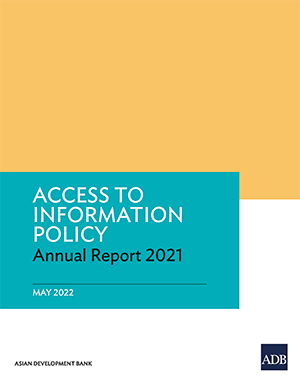ADB recognizes that eliminating poverty cannot be achieved without transparency and accountability. It shares information with people in Asia and the Pacific so they can participate in the bank’s development activities.
ADB’s commitment to empowering people by providing them with information was again recognized, retaining its position in the “very good” category for its sovereign and nonsovereign portfolios in the 2022 Aid Transparency Index.
The Access to Information Policy governs ADB’s sharing of information with a set of principles and exceptions. The policy went into effect in January 2019, superseding the rules-based Public Communications Policy, following a comprehensive 2-year review.

Access to Information Policy
ADB’s Access to Information Policy (AIP) reflects ADB’s ongoing commitment to transparency, accountability, and participation by stakeholders.

Implementation Arrangements
Operational Procedures that spell out procedural requirements and guidance on the implementation of the Access to Information Policy.


